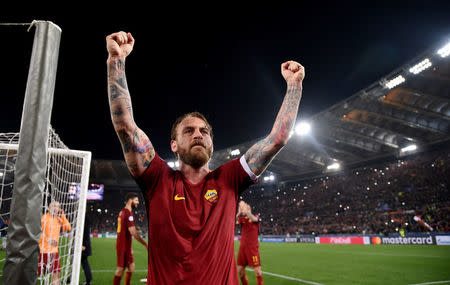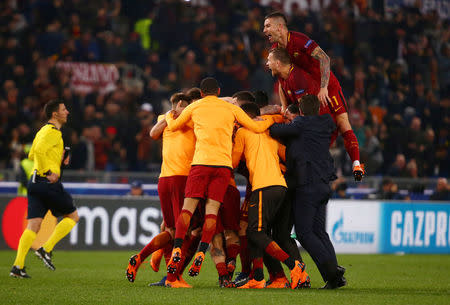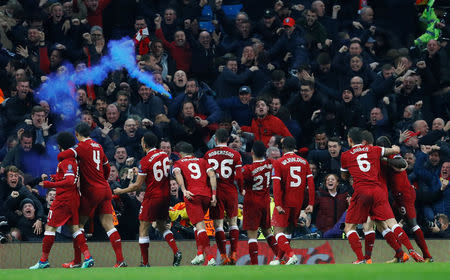Soccer: 'Underdogs' give Champions League much-needed shake-up
By Brian Homewood
ZURICH (Reuters) - Liverpool and AS Roma are not exactly small clubs yet their Champions League quarter-final wins are being hailed as a triumph for the underdog in a competition which is generally very low on surprises.
The English Premier League club reached the semi-finals for the first time since 2008 after winning 2-1 at Manchester City to complete a 5-1 aggregate win inspired by Mohamed Salah -- sold to them by Roma in the close season.
Roma, meanwhile, are in the last four for the first time since 1984, the days of the old European Cup, thanks to their rousing comeback against Barcelona. They hit back from 4-1 down after the first leg to win 3-0 at home and qualify on away goals.
They have also become the first Italian club, apart from Juventus, to reach the last four since Inter Milan in 2010.
Neither club are poor.
Liverpool were ninth in Europe in terms of revenue after they raked in 407 million euros ($504 million) in the 2016 financial year, according to a UEFA report published in January, while AS Roma were 16th with 219 million euros.
Yet, such is the concentration of power in European football that both teams were regarded as rank outsiders when drawn to face the financial might of their respective opponents.
With their remarkable wins on Tuesday, Roma and Liverpool are effectively gate-crashing a private members' club which has grown even more exclusive over the last few years.
Only nine different teams have reached the semi-finals in the previous six editions of the tournament - Real Madrid, Bayern Munich, Barcelona, Atletico Madrid, Juventus, Chelsea, Borussia Dortmund, Manchester City and AS Monaco.
PECKING ORDER
Despite their impressive tradition and record, Liverpool still have to fight to keep their star players and have seen Philippe Coutinho and Luis Suarez both depart for Barcelona in the past few years.
Roma, whose win was doubly surprising given their erratic league form, are further still down the pecking order and last year were forced to sell Salah to Liverpool.
The Egypt forward's 42 million euros fee now appears to be a bargain basement price after his performances this season, something which Roma sporting director Monchi blamed on an urgent need to sell him by June to meet UEFA Financial Fair Play rules.
Roma's thumping of Barcelona surprised even the Italian media who on the eve of the game had been forensically examining why Spanish club football was so superior to Serie A.
Roma coach Eusebio Di Francesco, lauded for his tactical approach to the match, said there was no reason why his team could not go all the way to the final.
"I'm the coach so I'll take the praise just as I take the criticism but I want to look forward," he said. "Why shouldn't we believe we can reach the final? That has to be our target. I don't want to stop here."
Liverpool and Roma's wins do not by any means represent a change in direction for Europe's flagship club competition.
From next season onwards, the five big leagues will have more places allocated to them in the lucrative group stage. Critics say the bigger clubs also get a bigger share of the revenue, creating a snowball effect, and the gap between the elite and the rest can only get bigger.
UEFA president Aleksander Ceferin has said competitive balance is the biggest issue facing club football although the European governing body has not yet produced concrete proposals for changing the situation.
A report last month by the Swiss-based CIES Football Observatory said that 29.5 percent of Champions League matches this season ended in a difference of three goals or more, compared to 21 percent at the same stage last season.
"It is disappointing that... competitive balance is still not being addressed by the football family," Lars Christer Olsson, head of the umbrella organisation representing European domestic leagues, said last week.
"This is a fundamental issue for our members and in the coming months we will be working hard to create a fairer and better model for financial distribution and solidarity."
($1 = 0.8078 euros)
(Writing by Brian Homewood in Bern, editing by Pritha Sarkar)



